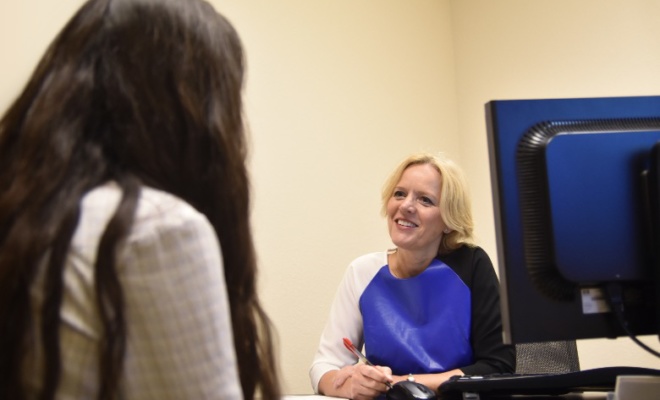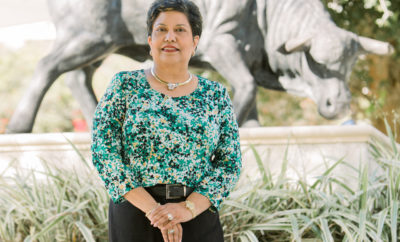
Education
Education Matters
University of South Florida Sarasota-Manatee
Last December, Gov. Rick Scott put forth his “Ready, Set, Work” initiative, which challenges all state-funded universities to have 100% of their graduates — save those moving on to graduate school — to have full-time employment within one year of receiving a degree in either of a school’s two most popular areas of study. The University of South Florida Sarasota-Manatee has accepted that challenge. Since then, the campus has studied how it prepares its students for future success by examining academic advising models at other Florida schools and exploring the latest research in college advising practices. The result is a new career-centric model that utilizes advisors taken from various industries who know the real-world opportunities, needs and challenges.
Regional Vice Chancellor for Academic and Student Affairs Dr. Terry Osborn explained, “As the university has moved toward ensuring that our graduates are ready for the careers they will enter, it was clear that we needed to think about academic advising in a new light. Traditionally, academic advising has been centered on a student development model. Though this model serves well in some ways, it became clear that a paradigm shift was in order. In short, to best serve our students today, career planning needs to begin much earlier in the academic experiences of a student.”
Osborn pointed out that the new career advising model incorporates career planning from before college admission through life after graduation. The intent is to ensure that each school experience builds upon and complements the others with the goal of creating career success for each graduate.
It’s more than just making sure that students sign up for the right classes and then apply to the right jobs. It’s an opportunity for industry experts who’ve become USFSM career advisors like Karin Weichlein, who held top sales positions at US and European companies, to inform students about what a specific job looks like five, ten, twenty years out. Weichlein strives to make sure that students know the importance of follow-through, the power of networking, and the impact of first impressions. “I hold them accountable to be timely, have good eye contact and not text during our advising sessions,” she explained. “I explore whether they are currently working and if they’ve started to think about their next professional career step. I work very closely with the local business community, and I’m always looking for outstanding, unique students who could benefit from a business mentoring relationship or from shadowing entrepreneurs to understand how hard it is to run a business successfully and why employers are looking for very specific soft skills as part of a student’s job preparedness.”
It’s easy to see how this kind of informed guidance and support is far better than the typical academic advising that most schools practice, and it helps the school meet Gov. Scott’s challenge. Osborn added that all the new career advisors are on the lookout for student internship opportunities. He explained, “Internships are opportunities for students to build upon the facets of the career success map. Knowledge and skills are applied, mindsets are tested and refined, networks are developed as experiences are gained and a student moves closer to receiving the credentials necessary to advance. These elements are critical to career success for anyone.”
Why would someone with a successful business background like Weichlein choose to work with college students versus remain solely within the workforce? She said that she was curious about millennials, their value system, their definition of success and their aspirations as it pertains to a professional career. She also said, “If we want to attract millennials to the workforce, we need to understand what gets them excited, what they are looking for from a future employer. I own my own company and I face the same issues as my fellow business owners in terms of effective communication, retention, aligning expectations and exciting millennials to take ownership of their professional responsibilities. By joining USFSM on a part-time basis, I work directly with millennials and benefit from their insights. As an example, here’s my most recent insight: millennials obtain information from different sources than we (baby boomers) traditionally use (i.e. Instagram/Snapchat versus local newspapers/TV channels). It’s quite hard to reach somebody if you don’t use the same messaging system. I now have a millennial write job/internship postings for our company to make sure they’re in a language that resonates with the target audience.”
Along with what the career advisors do, there are specialist advisors who can step in as needed to help with financial aid, wellness counseling, tutoring, and other issues students run across. USFSM’s Director of Student Success, Lauren Kurnov, said this is all part of what it takes to be a career-centric school. It means that “we are committed to ensuring that our students not only graduate with a high-quality education, but that they also enter the workforce with a clear understanding of the knowledge, skills and experiences that are essential for career success. Our team of core, career and specialty advisors work together to ensure that our students not only complete their degree requirements but also pursue internship opportunities and networking experiences in the community.”
The average full-time employment rates for state university graduates within their top two degree programs is about 60 percent. But if other Florida schools adopted USFSM’s career success map, that new number is sure to make Gov. Scott proud.






You must be logged in to post a comment Login